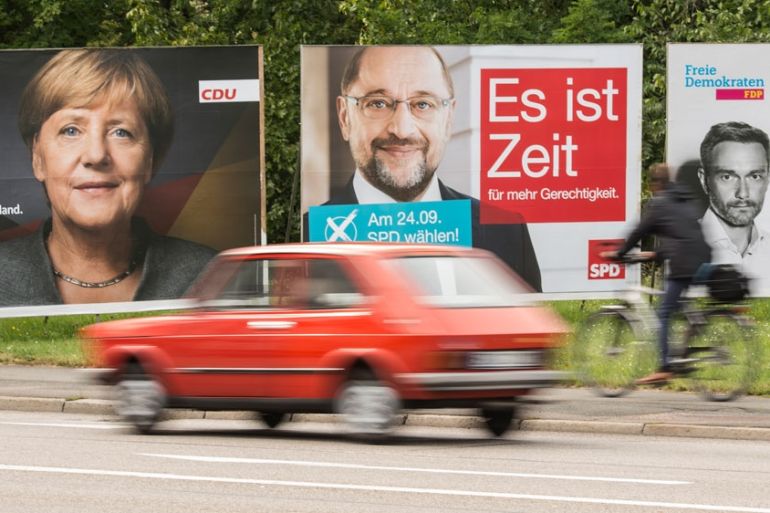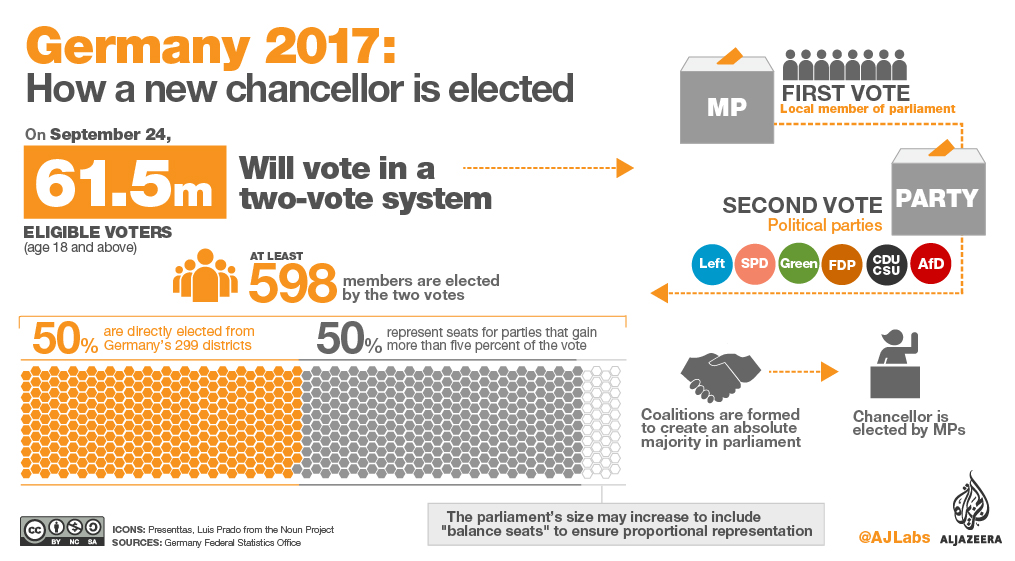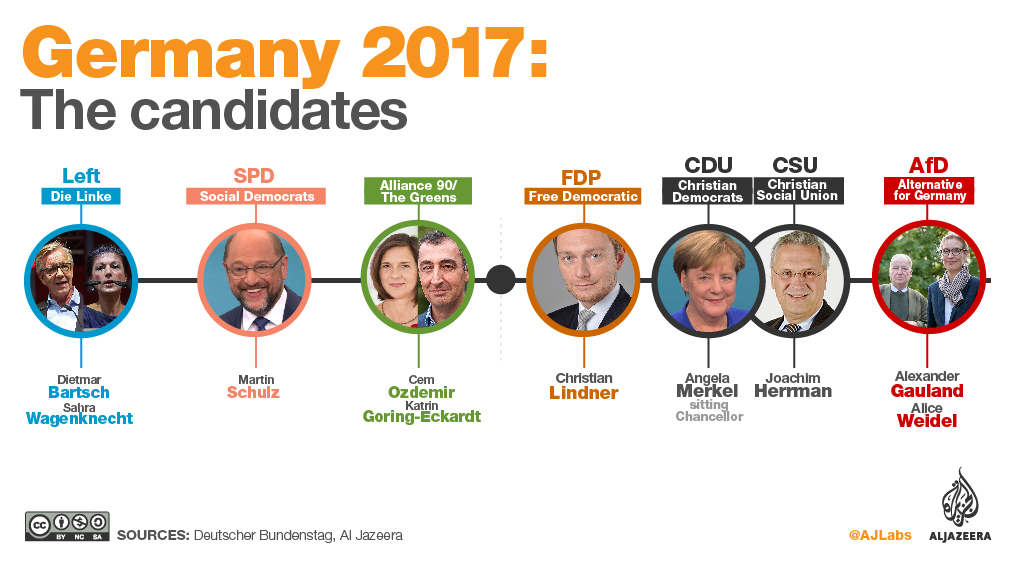How do the German elections work?
On September 24, Germans will head out to the polls to choose the 19th Bundestag.


On September 24, Germans will head out to the polls to choose the 19th Bundestag.
Angela Merkel has led the country since 2005 and currently, there is no limit on how many times a chancellor can be elected.
Keep reading
list of 4 itemsMapping Israel-Lebanon cross-border attacks
Eid Mubarak: Hear greetings in different languages
When is Eid al-Fitr 2024 and how is it celebrated?
The German parliament is made up of the Bundestag, which has federal legislative power and is elected directly by the German people, and the Bundesrat, which represents states (Lander).
Germany has a two-vote system in which eligible citizens vote once for their representative and again for a party. The respective votes do not have to be for the same political party.
Seats where candidates are directly elected make up 299 of the total, and a further 299 are allocated to parties based on their share of the vote. In order to secure a share of seats, a party must hold at least five percent of the overall vote.
The usual number of seats in the Bundestag is 598, but to ensure the share of seats reflects the proportion of the vote a party receives, more seats can be added. In 2013, a further 33 “balance seats” were created.
Once all the members of the Bundestag are in place, they select the federal chancellor, who serves as the head of the parliament. The president of Germany is a ceremonial position.

Christian Democratic Union (CDU)
The CDU has held the chancellor’s office for 48 of the 68 years since the Federal Republic of Germany was formed. Angela Merkel has led the party since 2005, and while she has come under heavy criticism for her refugee policy, she has also earned plaudits for her fiscal record.
Her platform favours a strong welfare system, high taxes, increased security through stronger state surveillance, and the use of the military to fight threats abroad
Social Democratic Party (SDP)
Germany’s oldest political party was established in 1863 and has seen Germany through the monarchy, two world wars, the rise of Nazism, and the division and reunification of the state. The party was traditionally the strongest opposition to the CDU and led government under former-Chancellor Gerhard Schroder between 1998 and 2005.
The SDP, which is currently in coalition with the CDU, is led by Martin Schulz, who has targeted Merkel over her immigration policy.
The SDP lost North Rhine-Westphalia, in a regional election in May, and is expected to win 23-25 percent of the overall vote.
Die Linke – The Left
Formed in 2007, the Left currently holds 8.6 percent of seats in the parliament. Its platform pledges to tackle the inequities of the capitalist system and champions greater rights for women. The party calls for the world to unite in resistance against profit, war and imperialism, believing that when profit rules there is little space for democracy. It is led by Dietmar Bartsch and Sahra Wagenknecht
Alliance 90/The Greens
The party is a merger between Alliance 90 and the Greens, and like Green parties in other parts of the world, it has had a played a small role in the wider politics of the country.
The main focus of the party is on ecological, economic and social sustainability issues, as well as a broadly leftist platform.
With a sitting minister-president of a state, the party now holds representation in all state governments. On a federal level, the party held 8.4 percent (63 out of 630) of the Bundestag seats.
The Greens usually perform well in university cities and are led by Simone Peter and Cem Ozdemir.
Christian Social Union (CSU – alliance with CDU)
The sister party of the CDU in the Bavarian state: Both take up seats in federal government together, however, the two are independent of each other beyond the federal level.
The CSU tends to be more socially conservative than the CDU, which is a nod to its religious roots but is considered further to the left to its partner on the federal level on social welfare.
Bavarian CSU voters make up seven to 10 percent of the total votes cast and as a result, the CSU is a crucial partner for CDU.
The party generally has a tougher stance on immigration than the CDU and is currently led by Joachim Herrman.
Free Democratic Party (FDP)
The FDP was formed after the second world war through the merger of the German Democratic Party and German People’s Party, and holds the distinction of being in government more than any other party since 1948.
Their presence in government has usually been as coalition partners for the CDU/CSU, but also includes a brief stint with the SDP.
The party is considered to be centrist and in support of the free market and privatisation.
It also places an emphasis on human rights, civil liberties, and internationalism.
It will be contesting the upcoming election under Christian Lindner’s leadership.
Alternative for Germany (AfD)
AfD is a relative young far-right party founded in 2013, which has taken up an anti-immigration and anti-Islam platform.
The party purports to be re-enforcing traditional German values and preserving the German culture.
It currently holds representation in some state parliaments and could enter the Bundestag for the first time under the leadership of Alexander Gauland and Alice Weidel.
Correction: This article previously stated that the AfD holds representation in all state parliaments. This is incorrect. The AfD actually is not represented in all German state parliaments.